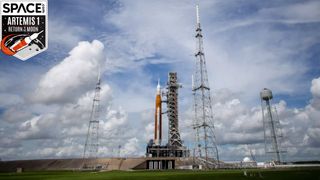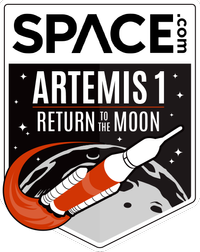Fuel leak delays NASA's Artemis 1 moon mission launch
The next launch attempt of Artemis 1 could occur as soon as Monday (Sept. 5).


CAPE CANAVERAL, Fla. — NASA called off the second attempt to launch an ambitious test flight of its new moon rocket on Saturday (Sept. 3), this time because of a stubborn leak that delayed fueling.
The space agency hoped to launch its Artemis 1 moon mission atop a towering Space Launch System (SLS) megarocket at 2:17 p.m. EDT (1817 GMT) on Saturday, but a hydrogen fuel leak detected about seven hours before liftoff thwarted the attempt.
"We have a scrub for the day, a cutoff, of the launch attempt for Artemis 1," NASA commentator Derrol Nail said at 11:17 a.m. EDT (1518 GMT) during a live broadcast.
Related: NASA's Artemis 1 moon mission: Live updates
More: 10 wild facts about the Artemis 1 moon mission
NASA engineers repeatedly tried to staunch the fuel leak during the Artemis 1 countdown. First, they tried to warm the tank connector and chill it with cold fuel to reseat the hydrogen quick disconnect connector. Next, engineers tried to repressurize it with helium, and then returned to the warm-and-chill method to stop the leak. All three attempts failed.
The delay, the second this week for NASA's Artemis 1 moon mission, means the agency will have to wait until Monday (Sept. 5) at the earliest to make its next launch attempt. And that's if the source of the leak can be fixed in time.
"We'll go when it's ready. We don't go until then, and especially now on a test flight," NASA Administrator Bill Nelson said in televised comments after the scrub. "This is part of the space business."
Get the Space.com Newsletter
Breaking space news, the latest updates on rocket launches, skywatching events and more!
Astronaut Victor Glover said the decision to scrub was "absolutely the right call."
"This is not a letdown," Glover told reporters here after the scrub. "This is understanding how these things work, these really incredibly complex machines that we want to try to integrate human beings in."
If NASA has to roll Artemis 1's SLS rocket back inside its Vehicle Assembly Building hangar for repairs, the launch will slip to October, Nelson said. NASA already plans to launch four astronauts to the International Space Station on SpaceX's Crew-5 Dragon mission in early October, so an Artemis 1 launch that month would be later in the month.
NASA currently has a 90-minute window to launch Artemis 1 on Monday, with liftoff occurring at 5:12 p.m. EDT (2212 GMT). If the agency doesn't try to launch Monday, it could try on Tuesday (Sept. 6), but the launch window is slim, just 24 minutes. A Tuesday launch, if attempted, would occur at 6:57 p.m. EDT (2257 GMT), NASA has said.
Artemis 1 does have a launch windows in mid-September, but NASA would likely have to push to mid-October due to the time needed to roll back and forth between Pad 39B and the Vehicle Assembly Building, mission managers have said. That October window opens on Oct. 17 and closes on Oct. 31, with cut outs between Oct. 24 and 26 and on Oct. 28. You can download NASA's full Artemis 1 launch availability calendar (PDF) to see all launch opportunities through mid-2023.
Artemis 1 is NASA's first test flight of the Artemis program to return astronauts to the moon by 2025. This mission is an uncrewed test of the Space Launch System, NASA's most powerful rocket ever, and its Orion spacecraft to make sure both vehicles are safe for astronauts.
Once launched, Artemis 1 will spend just over a month flying to the moon, looping Earth's natural satellite in a long orbit, and then returning to our planet for a splashdown in the Pacific Ocean off the coast of California.
Editor's note: This story was updated at 2:26 pm ET to include comments from NASA astronaut Victor Glover. This story was updated at 12:47 p.m. ET include comments from NASA chief Bill Nelson. Follow our Artemis 1 mission live updates page for the latest on Artemis 1 mission news. Visit Space.com for live webcast.
Email Tariq Malik at tmalik@space.com or follow him @tariqjmalik. Follow us @Spacedotcom, Facebook and Instagram.
Join our Space Forums to keep talking space on the latest missions, night sky and more! And if you have a news tip, correction or comment, let us know at: community@space.com.

Tariq is the Editor-in-Chief of Space.com and joined the team in 2001, first as an intern and staff writer, and later as an editor. He covers human spaceflight, exploration and space science, as well as skywatching and entertainment. He became Space.com's Managing Editor in 2009 and Editor-in-Chief in 2019. Before joining Space.com, Tariq was a staff reporter for The Los Angeles Times covering education and city beats in La Habra, Fullerton and Huntington Beach. In October 2022, Tariq received the Harry Kolcum Award for excellence in space reporting from the National Space Club Florida Committee. He is also an Eagle Scout (yes, he has the Space Exploration merit badge) and went to Space Camp four times as a kid and a fifth time as an adult. He has journalism degrees from the University of Southern California and New York University. You can find Tariq at Space.com and as the co-host to the This Week In Space podcast with space historian Rod Pyle on the TWiT network. To see his latest project, you can follow Tariq on Twitter @tariqjmalik.
